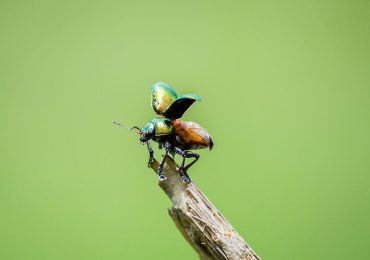The JRB chats to guest City Editor Lidudumalingani about his curatorship of this year’s African Book Festival, taking place from 26-28 August in Berlin, Germany.
The JRB: African writers have been winning all the awards recently, it feels like we’re at the crest of a wave. How does it feel to curate the African Book Festival right now? I imagine the chief emotion is excitement!
Lidudumalingani: Thank you for this interview. Excitement indeed, and maybe only that. I can’t agree more. The festival comes on the back of several awards given to African authors. For me, the way I have conceived the curatorial thinking behind the festival, it also comes on the back of centuries of African authors dreaming and writing incredible stories. This festival is, in a way, thinking of African literature as having existed, continuing to exist, and will exist for years to come. It has been an exciting few months putting the programme together and figuring out what conversations to have and what is the best way to do that.
The JRB: The theme of this year’s festival is ‘Yesterday. Today. Tomorrow.’, and you’ve said you hope the festival ‘explores the connections between writers, the way older writers hold the hand of the young writers when they write, and how in turn, they too hold the hand of the writers coming after them’. How important is this intergenerational conversation to you?
Lidudumalingani: Fred Moten, in a short interview for the MacArthur ‘Genius’ Fellowship, says that all writing and thinking is collaboration, that to think of it as not is a con. I think of intergenerational conversations as that. Reading is that. This festival is a platform to present this obsession of mine about thinking and writing. It’s an obsession that over the years has remained the same but has largely been altered by various factors. In a world in which it seems personal choices are increasingly narrowing, only giving space to what overwhelmingly resonates, there is space to fight for the single character, sentence, idea, that nudges our own thinking in a particular direction, beginning this intergenerational lineage of thinking and writing. This festival is doing that.
The JRB: You’re following in the footsteps of former curators German–Nigerian author Olumide Popoola, Zimbabwean writer, filmmaker and activist Tsitsi Dangarembga, and Angolan author and musician Kalaf Epalanga. How do you intend to shape the festival with your curation this year?
Lidudumalingani: The curation of the festival is quite personal, in that the curator brings their own taste, and I find that a refreshing idea. Every edition then feels like a plunge into an already complete world. I think that is largely my contribution and the contribution of everyone coming to the festival. I wanted a festival that adopts an amoeboid shape. Though the panels and readings are integral to the festival, I wanted other things in the mix, some dancing, some laughing.
The JRB: There will be a number of South African writers, musicians and artists at the festival this year, including Athambile Masola, Dudu Busani-Dube, Fred Khumalo, Maneo Mohale, Niq Mhlongo, Mphuthumi Ntabeni, Nozizwe Cynthia Jele, Outlwile Tsipane, Rešoketšwe Manenzhe and many others. What unique ideas and spirit do you think South Africa will bring to the festival?
Lidudumalingani: I think that they’ll offer a diverse gaze at South Africa from inside, a gaze at the world from the South African perspective, and mostly, for me, a physical presence in Berlin. I’d like for these writers to find new audiences, but equally, for the audience to find new writers.
The JRB: The legendary Margaret Busby is the festival headliner this year, who was Britain’s youngest and first black woman publisher. The publication of African literature is still such a thorny topic, both in the Global North and in South Africa. Is this a conversation you intend to centre at the festival?
Lidudumalingani: Absolutely, Margaret will be in conversation with Dr Athambile Masola and that conversation is going to be exciting because it encapsulates the entire curatorial ethos for the festival. It sets the tone. More than having the conversation though, my personal agenda is to present the work by the authors, so that this conversation is had along that. The work is here and it keeps coming out.
The JRB: One of the aims of the African Book Festival is to address the social and political issues that interact with culture and the arts. How do you think this is significant for the participants that have been invited this year, and what do you hope to impart to a Berlin-based audience?
Lidudumalingani: My single agenda, underneath all of the panels, the mingling, the dancing, the laughing, is to open the Berlin reading audience to African literature. We’re not there to beg for a place on bookshelves in German bookshops but we’re there to demand it, to claim it, and that is my biggest wish. That is a hope that takes care of both the writers and readers. I hope after the festival German readers consider picking up a South African at any bookshop, the same way they may consider an author from Germany. And I want that to be a choice of intimacy rather than some political stance. During the three days of the festival, the idea is to establish that, the intimate ways the readers can get to know the authors and vice versa.
The JRB: Finally, as part of your mission statement for the festival you wrote: ‘Writing is a solitary pursuit but no writer sits alone at their desk and writes.’ A book festival is of course a vital space for writers to connect and interact. Is this something you had in mind when curating the festival?
Lidudumalingani: Yes, I did. We’ve designed the space such that writers and readers are always in conversation. Beyond the stage. My hope is for writers to take all of it in. Their own presence, other writers, the readers, the space, the talks, the conversations off the stage.
The JRB: Thank you very much for your time! Here’s wishing every success for the 2022 Africa Book Festival.
Lidudumalingani: Thank you. Thanks for JRB’s support and interest. It means a lot.
- Jennifer Malec is the Editor. Follow her on Twitter.
- Guest City Editor Lidudumalingani is a writer, filmmaker and photographer, and winner of the 2016 Caine Prize. Follow him on Instagram and Twitter.





